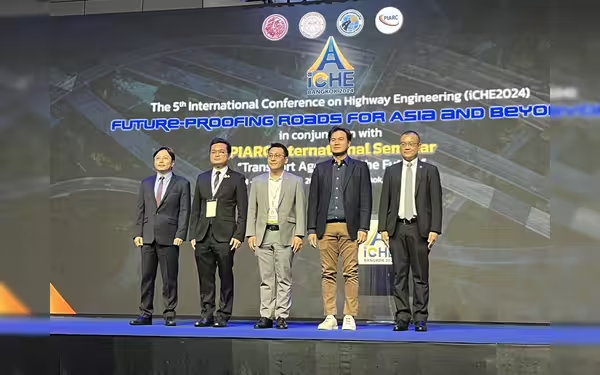Saturday, November 16, 2024 05:31 PM
Smart Mobility Revolution: M-Flow System at iCHE 2024
- M-Flow system enhances highway efficiency and reduces traffic jams.
- Thailand's toll collection adoption rises to 42% with M-Flow.
- AI and 5G technologies are vital for sustainable transport systems.
 Image Credits: prnewswire_apac
Image Credits: prnewswire_apaciCHE 2024 highlights the M-Flow system's role in smart mobility and traffic management in Thailand.
The world is rapidly evolving, and so is the way we think about transportation. At the forefront of this evolution is the concept of smart mobility, which aims to make travel more efficient, safe, and environmentally friendly. The recent iCHE 2024 event showcased the latest advancements in this field, particularly focusing on the Multi-Lane Free Flow (M-Flow) system, which is gaining traction globally.
Kenny Chen, the Managing Director of FETC International Thailand, expressed his excitement about participating in iCHE 2024. He stated, "We are honored to be part of iCHE 2024 and delighted to host esteemed guests from Thailand's transport industry." Among the notable attendees were high-ranking officials from Thailand's Department of Highways, a professor from Chulalongkorn University, and the President of the Thailand Intelligent Transportation System (ITS) Association. These experts shared their experiences and insights on how Thailand is embracing the M-Flow system to alleviate traffic congestion.
During the seminar, Mr. Chen highlighted the numerous benefits of M-Flow technology. He pointed out that it not only enhances highway efficiency but also plays a vital role in the development of smart cities. The M-Flow system allows for barrier-free toll collection, which means vehicles can pass through toll booths without stopping, significantly reducing traffic jams.
Dr. Piyapong, the Deputy Director of the Department of Highways, emphasized the importance of smart transportation in the Asia-Pacific region, a crucial hub for global trade. He remarked that the future of transportation relies on integrating digital technologies like artificial intelligence (AI) and 5G. These technologies are essential for achieving net-zero emissions and creating sustainable transport systems.
Reflecting on the challenges faced by Thailand's toll collection system, Dr. Thanasak, the Director of the Intercity Motorways Division, shared that the adoption rate of electronic toll collection had stagnated at 30% for a decade. He explained, "However, after the introduction of the M-Flow system, usage rates have risen to 42%, growing at a rate of 8% annually. By 2025, three highways and 29 toll booths in Thailand are expected to fully implement M-Flow." This increase in usage demonstrates the positive impact of the M-Flow system on traffic management.
Chulalongkorn University Professor Dr. Agachai discussed the technical hurdles of implementing an AI-powered tolling system. He noted that the system must accurately read Thai letters, numbers, and even province names on license plates. He stated, "Through continuous adjustments and learning, the AI technology has been fine-tuned to accurately recognize Thai license plates." While the M-Flow system has been praised for its convenience, he stressed the need for ongoing improvements and public awareness to boost adoption rates.
Dr. Tongkarn, President of the Thailand ITS Association, added that Intelligent Transportation Systems are crucial for developing smart cities. He stated, "The future of smart transportation lies in innovations such as autonomous driving, real-time traffic management, and predictive road and equipment maintenance, all made possible by AI and 5G technologies." He also highlighted the importance of data protection to ensure that technological advancements align with ethical standards.
FETC International Thailand's involvement in iCHE 2024 underscores its commitment to transportation innovation and global collaboration. The company was recently honored with the Taiwan Prime Award for its advancements in AI technology, further solidifying its role as a leader in the field.
The discussions at iCHE 2024 reflect a significant shift towards smarter, more efficient transportation systems. As countries like Thailand adopt innovative technologies such as the M-Flow system, the future of travel looks promising. With continued advancements in AI and digital integration, we can expect a world where transportation is not only faster but also more sustainable and user-friendly.













